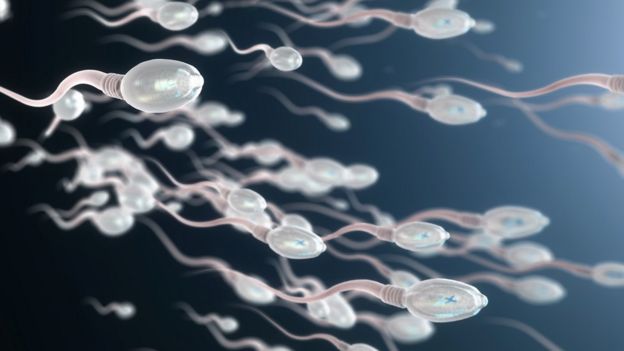Eating nuts regularly could improve sperm health, a study suggests.
Men who ate about two handfuls of mixed almonds, hazelnuts and walnuts daily for 14 weeks improved their sperm count and had more viable "swimmers", scientists found.
The study comes amid a decline in sperm counts across the Western world, linked to pollution, smoking and diet.
Researchers said there was growing evidence a healthy diet could boost the odds of conceiving.
About one in seven couples have difficulty getting pregnant and about 40-50% of cases of infertility are attributable to men.
The scientists randomly divided 119 healthy men between the ages of 18 and 35 into two groups:
- One added 60 grams (2oz) of nuts a day to their normal diet
- One made no changes to what they ate

Those in the nut group improved sperm:
- count by 14%
- vitality by 4%
- motility (movement) by 6%
- morphology (shape and size) by 1%
All of these are the parameters the World Health Organization lists as measurements of sperm quality and are associated with male fertility.
Experts said the study backed up others that showed a diet rich in omega-3 fatty acids, antioxidants and the B vitamin folate improved fertility.
Nuts contain many of these and other nutrients.
"Evidence is accumulating in the literature that healthy lifestyle changes such as following a healthy dietary pattern might help conception," said Dr Albert Salas-Huetos, from the Universitat Rovira i Virgili, in Spain, who led the study.
'Interesting academically'
However, researchers cautioned that these men were healthy and apparently fertile, so it was not clear whether the findings would apply to the wider population, including men with fertility problems.
Allan Pacey, professor of andrology at the University of Sheffield, who was not involved in the research, said it was also possible that men in the nut group might have made other positive changes to their lives not taken into account by the study.
Dr Virginia Bolton, formerly consultant clinical embryologist at Guy's Hospital in London, said the findings were "interesting academically" but it was impossible to say what effect they would have in terms of boosting the chances of pregnancy.
She added: "But meanwhile, until we get the answers to the questions, we should all be encouraging all of our patients to stop drinking alcohol, stop smoking, eat healthily, all of the standard things."
The results of the study are being presented at the annual meeting of the European Society of Human Reproduction and Embryology in Barcelona.
Latest Stories
-
#Election2024: Volta Region takes delivery of ballot papers
15 mins -
Dissolve Black Stars and form a new team – Ernest Thompson
18 mins -
‘We’re cruising; victory is beckoning at us’ – Afriyie Ankrah assures NDC faithful
22 mins -
It’s completely senseless to think I bought one coconut for $100 in Brazil – Afriyie Ankrah
31 mins -
‘There is no way an election in Ghana can be rigged’ – EC
35 mins -
Collation Centres Accreditation: EC, GJA and GIBA planning ‘workable and acceptable’ solution for media
49 mins -
Engage locals in tree planting to reclaim degraded lands – Forestry Commission directs mining companies
1 hour -
Ghana Gold Coin goes on sale: A quarter ounce at GH₵11,188.12 on Nov. 26
1 hour -
Special Voting on Monday, 2nd December, 2024 – All you need to know
1 hour -
3rd F.K. Buah Memorial Lecture honours the Educationist, Author, and Statesman
2 hours -
First Sky Group appoints Dr Elorm Amegatsi as Live Patron
2 hours -
Thousands of job opportunities opened for the youth under Ghana’s Petroleum Hub Project – CEO
2 hours -
Gov’t must act on clean air now – Prof Kofi Amegah
2 hours -
Politicians who ignore social media as a constituency risk losing out – Technology Analyst
3 hours -
Akufo-Addo has built over 200 hospitals, most by any president – Ofosu Nkansah
3 hours

